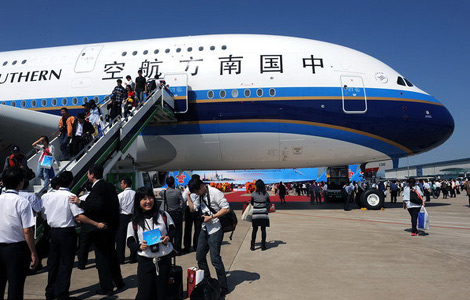Why China focuses on cultural development
Updated: 2011-10-17 21:24
(Xinhua)
|
|||||||||||
BEIJING - The ongoing plenary meeting of the Communist Party of China (CPC) Central Committee is focused on the country's cultural development.
Cultural development may seem like an unusual topic for such high level meetings -- especially considering last year's plenum centered around the country's blueprint for development for the next five years -- but the discussion is actually happening at an important moment in China's development.
Despite China's economic miracles outshining other countries and the remarkable cultural and ideological progress it has made, China faces unprecedented challenges in the field of culture.
Chinese companies such as Sinopec and China Mobile are not newcomers to the list of the world's top 500 companies, but Chinese cultural companies have yet to produce a world-famous brand.
China produces the most TV series in the world, with about 14,700 episodes produced every year, but the import-export ratio is an embarrassing 15-to-1.
The total combined income of all 500 publishing houses in China is less than that of Germany's Bertelsmann.
Disney created the animated blockbuster "Mulan" based on a well-known Chinese folk heroine. The film was popular in China as well as in international markets, but China has yet to produce an animated film as internationally successful as "Mulan."
China is taking center stage economically and diplomatically, but its image is often distorted in the West.
The "deficit" in cultural exchange and disadvantage in international cultural competition concern not only the size of market share, but also the country's initiative in ideology and soft power, China's flagship newspaper the People's Daily said in a signed commentary.
Economic basis determines superstructure. China, which is now the world's second largest economy, has every reason to step up efforts to bring its culture in line with its economic status.
China has realized that culture has increasingly become a major source of national cohesion and creativity, a leading factor in the competition of national strength, and a backbone of economic and social development.
History has shown that when a nation awakes it always begins with cultural awareness, and the strength of a political party is greatly determined by its consciousness of culture.
The Chinese nationality has created an extensive and profound culture with a long history, and it can surely add new splendor to Chinese culture on the basis of inheriting and enriching its fine traditional culture.
Hot Topics
Libya conflict, Gaddafi, Oil spill, Palace Museum scandal, Inflation, Japan's new PM, Trapped miners, Mooncake tax, Weekly photos, Hurricane Irene
Editor's Picks

|

|

|

|

|

|







